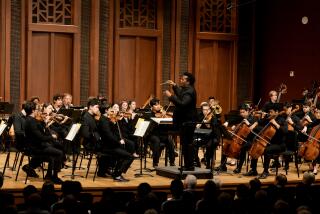THE SEQUOIA QUARTET PLAYS HAYDN, CARTER
At first, the yoking of Haydn’s “Joke” Quartet and Elliott Carter’s latest Quartet seems workable only as a study in contrasts. But the Sequoia Quartet demonstrated Tuesday at the Japan America Theatre that there is a surprising resonance between the two.
Not that Carter’s Fourth Quartet is a funny, or even relaxed, work. It plunges immediately into assertive dialectic, each part bearing its own witness to the rigor of Carter’s musical thought. The argument is earnestly developed, with a debater’s concern for formal propriety.
Though played in one continuous movement, Carter’s Quartet is shaped very much like Haydn’s, with musical weight similarly disposed. It also ends like the “Joke”--minus any hint of humor--in a halting series of reminiscences. The hesitant feeling at the beginning of the finale seemed the composer’s responsibility, rather than any fault in the ensemble’s dark reading.
The Sequoians exaggerated Haydn’s “Joke” at every punch line, from the famous ending to first violinist Peter Marsh’s rustically drooling slides in the Scherzo. But they also found tears behind the smiles in the Largo, the movement with the strongest emotional ties to the Carter.
The Sequoia Quartet--now consisting of violinists Marsh and Miwako Watanabe, violist James Dunham and cellist Bonnie Hampton--was part of a consortium commissioning Carter’s Quartet. A recent local performance of the work by another member of the group, the Composer’s Quartet, deprived this reading of the prestige of a West Coast premiere.
The Sequoia’s “and Friends” concerts have always been popular, and the guest on this occasion, cellist Laurence Lesser--a native Angeleno now president of the New England Conservatory--has a local following of his own.
Lesser exerts a strong musical presence, and frequently assumed leadership in Schubert’s Quintet. The performance had its scrappy moments, but was also deeply felt and full of character. Though it was not always Schubert’s character that emerged, the results nonetheless ultimately proved stirring.
More to Read
The biggest entertainment stories
Get our big stories about Hollywood, film, television, music, arts, culture and more right in your inbox as soon as they publish.
You may occasionally receive promotional content from the Los Angeles Times.










